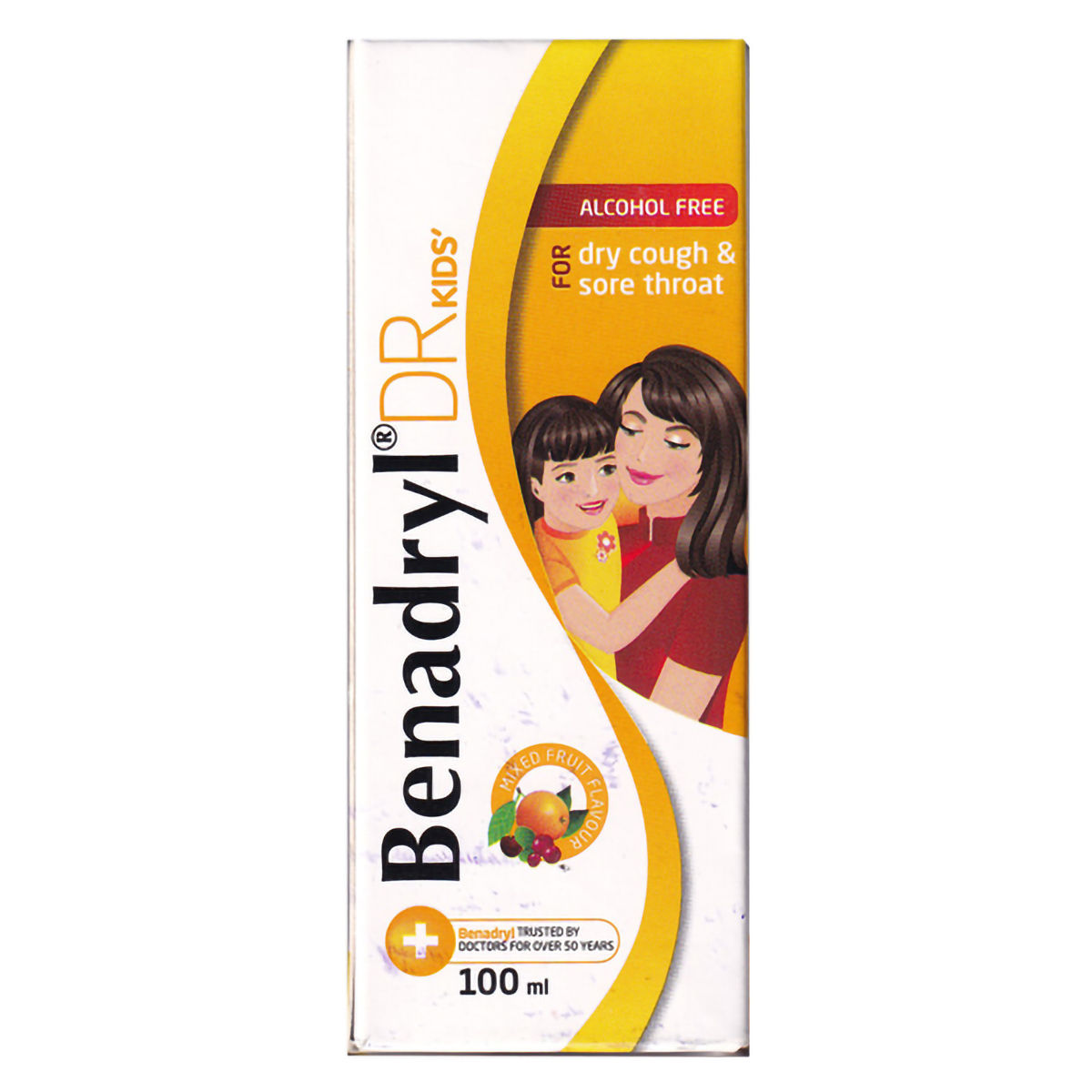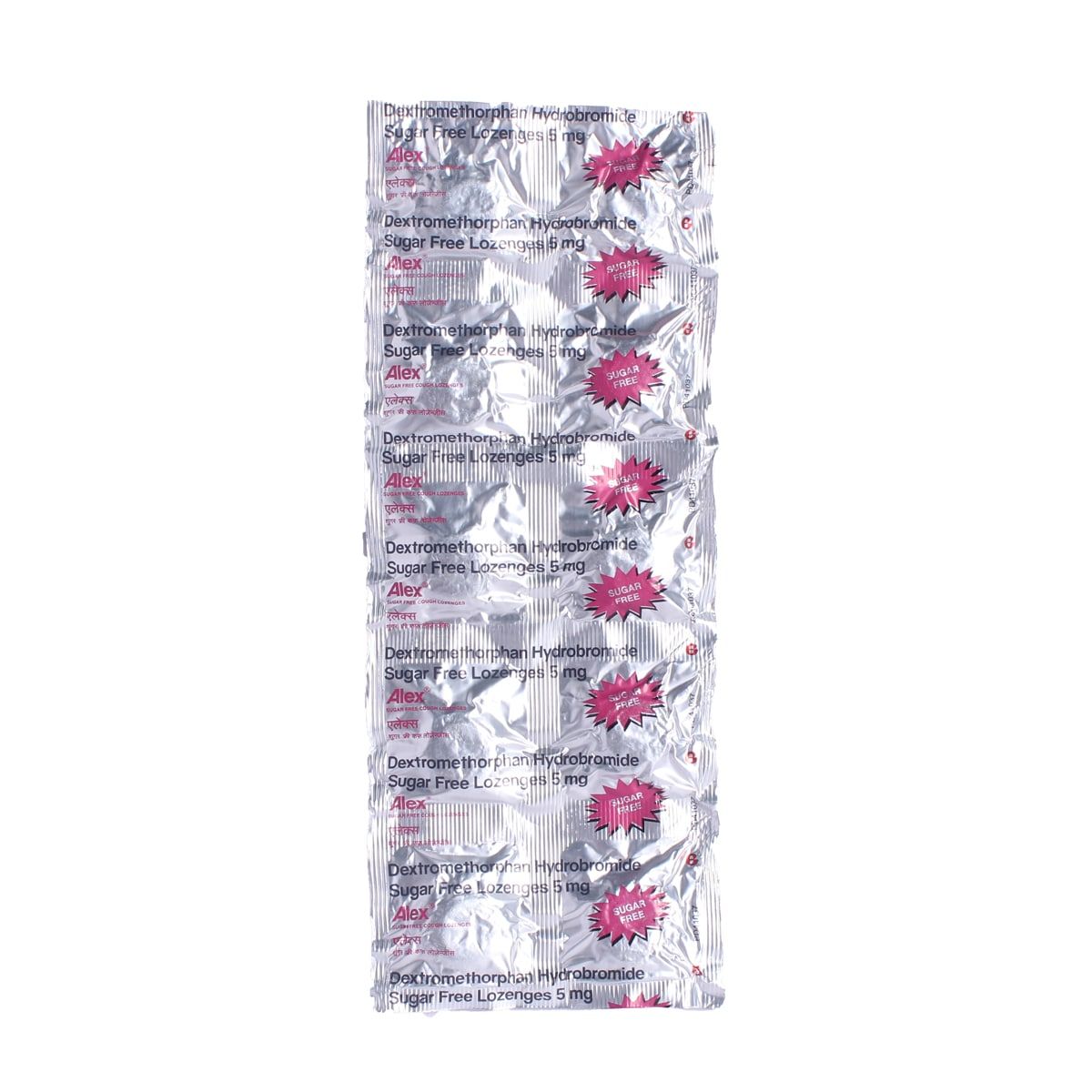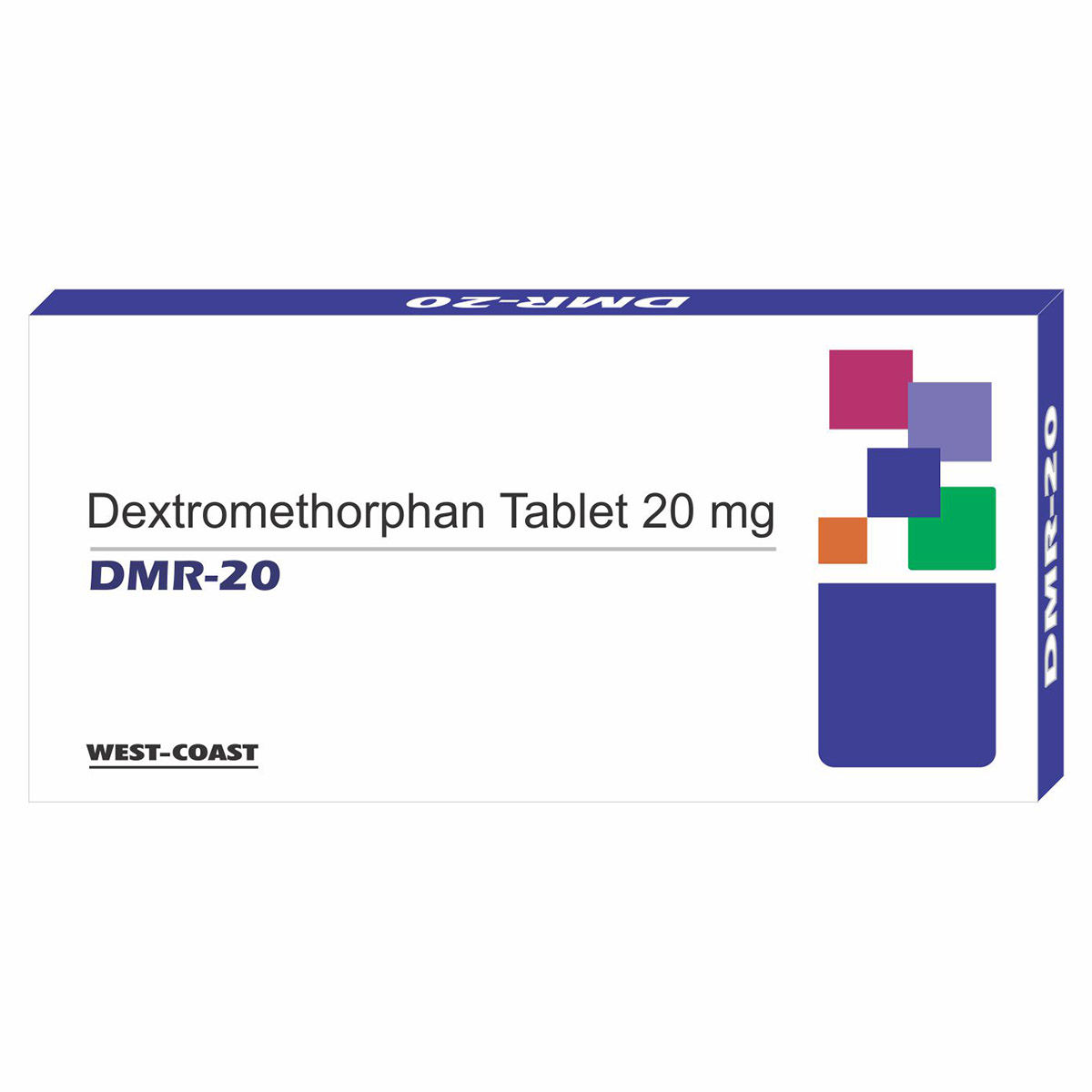Dextromethorphan
About Dextromethorphan
Dextromethorphan belongs to the class of antitussives and is used to treat a dry cough. A dry cough is a cough that doesn’t produce mucus and often feels scratchy or tickly in the throat.
Dextromethorphan contains Dextromethorphan, a cough suppressant that works by blocking the cough centre in the brain to reduce the urge to cough. It is generally prescribed for the short-term treatment of dry cough and is not meant for chronic cough or cough caused by smoking, emphysema, or asthma.
Take Dextromethorphan in the dose and duration prescribed by your doctor based on your medical condition. Common side effects may include dizziness, drowsiness, sleepiness, confusion, and nausea. Most of these side effects do not require medical attention and typically subside over time. However, if they persist or worsen, please consult your doctor.
Do not take Dextromethorphan if you are allergic to any of its components. Inform your doctor if you are pregnant or breastfeeding before starting Dextromethorphan. Also, tell your doctor about any pre-existing medical conditions and any other medications you are taking to avoid possible interactions. Dextromethorphan is not recommended for children under 4 years of age.
Uses of Dextromethorphan
• Suppresses Dry Cough: Dextromethorphan helps reduce dry, irritating cough by acting on the cough centre in the brain to suppress the reflex.
• Improves Sleep and Comfort: By controlling persistent coughing, Dextromethorphan aids in better rest, especially during the night.
• Provides Symptomatic Relief: It offers temporary relief from cough caused by minor throat and bronchial irritation, such as due to a cold or inhaled irritants.
Medicinal Benefits
Dextromethorphan is an antitussive (cough suppressant) used to relieve dry, irritating, or persistent cough. It works by acting on the cough centre in the brain to reduce the urge to cough, helping provide relief from sleeplessness or discomfort caused by constant coughing. It is commonly used for the short-term treatment of coughs caused by colds or respiratory infections when the cough is dry and non-productive (i.e., without mucus).
Directions for Use
- Dextromethorphan can be taken with or without food, as advised by the doctor.
- Follow your doctor's instructions on the dosage and timing of this medication to ensure safe and effective use.
- Swallow Dextromethorphan as a whole with a glass of water.
- Do not crush, chew, or break it.
Storage
Side Effects of Dextromethorphan
- Dizziness
- Drowsiness
- Diarrhea
- Respiratory depression
- Sleepiness
- Confusion
- Rash
- Nausea
Drug Warnings
Do not take Dextromethorphan if you are allergic to Dextromethorphan or any of its components. Dextromethorphan should not be stopped abruptly as it might lead to withdrawal symptoms like irritability, anxiety, diarrhoea, restlessness, and increased blood pressure. If your condition does not improve, your cough returns, or if a fever or rash accompanies it, please visit your doctor immediately, as this could be a serious issue. Also, Dextromethorphan should be taken at least 15 days after your last dose of antidepressants, especially monoamine oxidase inhibitors (MAO), as taking both together may be fatal. If you are pregnant or breastfeeding, please inform your doctor before starting Dextromethorphan. Please do not smoke, as it might worsen your symptoms. Let your doctor know if you are taking any other medications or if you have any pre-existing medical conditions so that they can rule out potential interactions. It is not recommended for children under 4 years of age.
Drug Interactions
Drug-Drug Interaction: Dextromethorphan may interact with MAO inhibitor (isocarboxazid, phenelzine, rasagiline, selegiline, tranylcypromine), anti-arrhythmic medications (amiodarone, propafenone, quinidine and flecainide), opioid analgesics (codeine, tramadol, morphine, methadone), anti-anxiety medications (fluoxetine, paroxetine, sertraline) and antifungal (terbinafine).
Drug-Food Interaction: Avoid alcohol consumption while taking Dextromethorphan as it may cause increased drowsiness, dizziness, and lack of concentration.
Drug-Disease Interaction: Inform your doctor if you have cardiovascular disease, Benign prostate hyperplasia (BPH), diabetes or glaucoma as these conditions may cause interactions.
Drug-Drug Interactions Checker List:
Safety Advice

Alcohol
unsafeAvoid consumption of alcohol with Dextromethorphan as it may increase drowsiness.

Pregnancy
cautionConsult the doctor if you are pregnant. The doctor may prescribe this medication only if the benefits outweigh the risks.

Breast Feeding
cautionConsult the doctor if you are breastfeeding women. The doctor may prescribe this medication only if the benefits outweigh the risks.

Driving
cautionDextromethorphan may cause drowsiness or tiredness in some individuals. Therefore, drive or operate heavy machinery only if you are alert after taking Dextromethorphan.

Liver
consult your doctorDextromethorphan should be taken with caution, especially if you have a history of Liver diseases or conditions, as the dose may be adjusted by your doctor as required.

Kidney
consult your doctorDextromethorphan should be taken with caution, especially if you have a history of kidney diseases or conditions, as the dose may be adjusted by your doctor as required.

Children
cautionDextromethorphan should be used in children only if prescribed by a doctor, and it is not recommended for children under 4 years of age.
Habit Forming
Diet & Lifestyle Advise
- Drink warm fluids to keep your throat moist and reduce irritation.
- Use a humidifier to maintain comfortable indoor humidity levels.
- Avoid exposure to smoke, dust, and strong fragrances.
- Ensure you get enough rest to support your immune system.
- Eat a balanced diet rich in fruits, vegetables, and whole grains.
- Honey (for those over 1 year) may help soothe throat discomfort.
- Practice slow, gentle breathing to reduce coughing triggers.
- Elevate your head slightly while sleeping to ease nighttime coughing.
Special Advise
- Do not smoke as it might worsen your symptoms, so avoid tobacco intake.
- Avoid alcohol consumption with Dextromethorphan as it may cause tiredness, drowsiness, or lack of concentration.
- Do not use dextromethorphan if you have used an MAO inhibitor within the past 14 days. (isocarboxazid, phenelzine, rasagiline, selegiline, tranylcypromine or methylene blue injection).
Patients Concern
Disease/Condition Glossary
Cough: It is a reflex action that helps to clear any foreign irritant or mucus in the throat. Mostly, a cough lasts for a short time (two to three weeks), so it is acute. However, sometimes, if it persists for more than eight weeks, it can lead to chronic cough. If the cough is accompanied by blood or a barking cough, this could be serious and require medical attention. The most common causes of cough are cold/flu, asthma, emphysema, and COPD (chronic obstructive pulmonary disease). Also, some medications, especially angiotensin-converting enzyme inhibitors used for hypertension, are known to cause cough.
FAQs
Dextromethorphan is used to treat dry cough, which is a cough that doesn’t produce mucus and often feels scratchy or tickly in the throat.
Dextromethorphan works by targeting the cough centre in the brain to suppress the cough reflex. This action reduces the frequency and intensity of dry, non-productive cough. As a result, it helps provide relief and improves overall comfort.
Yes, you can usually stop taking Dextromethorphan when your cough subsides, but always follow your doctor’s advice.
It is not recommended to take Dextromethorphan with any antidepressant medications, as it contains dextromethorphan, which can cause unpleasant side effects or drug interactions. If you have been on antidepressants, especially monoamine oxidase inhibitors (MAOIs), wait at least 15 days after your last dose before taking Dextromethorphan.
No, never take more than the prescribed dose of Dextromethorphan. It may lead to symptoms like nausea, vomiting, drowsiness, dizziness, unsteadiness, changes in vision, difficulty in breathing, fast heartbeat, hallucination, seizures, and coma.
Dextromethorphan is a cough suppressant that contains dextromethorphan. It is not a steroid, opiate, antihistamine, narcotic, or NSAID. It does not contain alcohol or codeine. It is generally not classified as a controlled substance in most countries, though some places may have regulations on its sale due to its potential for misuse. Always use it as directed by your doctor or pharmacist.
Dextromethorphan is an effective cough suppressant that works by acting on the brain to decrease the cough reflex. The recommended dose of dextromethorphan varies depending on individual factors such as age, height, and severity of condition. It's essential to take dextromethorphan exactly as directed by your physician, as they will determine the appropriate dose and frequency based on your specific needs.
Dextromethorphan is generally considered safe when taken as directed by a physician. However, it can cause drowsiness and fatigue, especially when taken in large doses or combined with other medications that cause sedation. If you're taking dextromethorphan, it's essential to be cautious when driving or operating heavy machinery. Additionally, dextromethorphan can increase blood sugar levels in some individuals, particularly those with diabetes. If you have diabetes, it's crucial to monitor your blood sugar levels closely while taking dextromethorphan.
Dextromethorphan is generally safe for people with high blood pressure but check with your doctor first. It may slightly increase blood pressure in some individuals. It does not thin blood or affect blood clotting. Always consult your doctor for personalized advice.
You can safely take Dextromethorphan with benzonatate, acetaminophen, ibuprofen, pseudoephedrine, guaifenesin, and Tamiflu. However, use caution when taking dextromethorphan with codeine or diphenhydramine as it may increase drowsiness. Always consult your doctor or pharmacist before combining medications, as they can provide personalized guidance based on your specific needs and medical history. It's important to ensure safe usage and avoid potential interactions.
If your doctor prescribes Dextromethorphan with antibiotics, it's safe to take. But if not, don't take it. Do not club any medications unless advised by the doctor.
Avoid consumption of alcohol with Dextromethorphan as it may increase drowsiness. Please consult a doctor before consuming alcohol with Dextromethorphan.
Before taking Dextromethorphan, it's crucial to get a proper diagnosis from a doctor. This ensures that the medication is suitable for your specific condition and won't interact with any ongoing medications or worsen underlying diseases. A doctor's guidance is essential to ensure safe and effective treatment, so don't self-medicate – consult a professional first.
Take Dextromethorphan for the dose and duration as prescribed by the doctor based on your medical condition for optimal results.
The most common side effects of Dextromethorphan are dizziness, drowsiness, sleepiness, confusion, and nausea. Most of these side effects of Dextromethorphan do not require medical attention and gradually resolve over time. However, if the side effects persist or worsen, please consult your doctor.
Consult your doctor before taking Dextromethorphan if you have an underlying medical condition, such as liver disease, kidney disease, or respiratory problems.

.jpg?tr=q-80)







